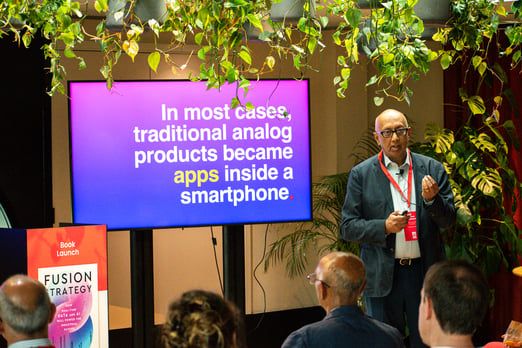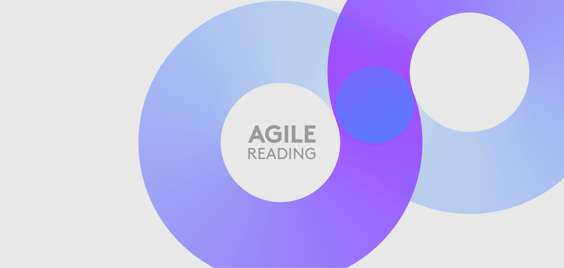Events
Is your organisation future-ready?
14 October 2020 • 4 min read
.jpg?width=1920&height=836&name=Is%20Your%20Organisation%20Future%20Ready%20(1).jpg)
Is your organisation future ready?
Innovation futurist and award-winning speaker, Shivvy Jervis, joined AND Digital on 29th September to share her insights on which human-centred breakthroughs need to be on your radar now.
In this article we’ll explore some of the key takeaways from her event that highlight how you can become future ready - you can also watch a recording at the end of the article.
Striking opportunities caused by the pandemic
Shivvy kicked off her session by acknowledging the turmoil we’ve all faced in 2020, and the uncertainty it has created for businesses of every size and scale. However, she also highlighted four areas that, amidst the turmoil and tragedy of Covid-19, do offer businesses a way to improve their resilience and support their people.
Moving processes
When a crisis hits, many processes within an organisation that were previously seen as fact, or set in cultural stone, can suddenly become unlocked - and what once seemed low priority, or even a left-field idea, can gather a new sense of possibility and urgency.
Change-makers can harness the moment - and one particular example Shivvy highlighted is the new conversations and increased interest in flatter structures and distributed control that have grown as a result of remote working. These conversations, which were impossible for some organisations to consider previously, are now allowing previously hidden talent or opportunities to improve efficiencies across organisations to surface and thrive.
The digital divide
At a time when people are relying more than ever on technology, it’s striking that 3.7 billion people still don’t have access to the internet, and more than 1 billion children across the world have been locked out of virtual classrooms this year.
By bringing these issues to the fore, the pandemic is forcing companies to take this much more seriously. Organisations who rely on technology, or had to pivot to make more use of it during the pandemic, need to consider how they will make their products and services available to those currently not connected.
Digital skills
A topic close to our hearts at AND, and a stark statistic from Shivvy, highlighted that 37% of workers across Europe do not have basic digital skills and, within the next decade, 80% of all jobs will require digital literacy.
We may well be seeing a new urgency in the drive to close the digital skills gap , with companies investing more in upskilling their people. While our digital expectations keep rising and technology continues to proliferate more generally, the effect of Covid-19 has served to further highlight just how essential digital talent is to a company’s resilience and ability to adapt to fast-moving change.
The moral economy
The pandemic has also been forcing organisations to reassess their values, what they stand for and the way their culture is built and experienced.
Rather than focusing on the physical layout of their workspace as a prime cultural asset, for example, leaders will have to address not just how work gets done but how culture itself is built across a dispersed and remote workforce. Shivvy forecasted that we will see many more people-driven advances being unlocked at a greatly accelerated speed as a result of the cultural shifts caused by Covid-19.
Advances in AI
In the next section of the talk, Shivvy moved away from the pandemic to explore different advances in AI and the impact these will have on both organisations and their end users.
Emotionally-aware bots
Shivvy argued that we will shift towards affective computing, with AI becoming increasingly aware not just of our instructions, but also of our emotions. Affective computing will allow a system to pick up on a user’s reactions and factor that into what information it shares, for example, as well as determining how it shares it.
With the expectation that consumers will interact more with bots over the next few years, it’s important to humanise these interactions as much as possible, creating a more conversational, realistic experience for the customer.
New sources of employment
This shift to affective computing, as well as other new strands of AI, is and will continue to open up a variety of new job roles. The World Economic Forum predicts that we’ll see more than 133 million new roles as a result of this new relationship between humans, robots and algorithms. It’s important now to understand how these new roles will fit within your organisation and make sure your recruitment strategy is aligned with your product roadmap or service offering.
Augmented scenarios
Shivvy also emphasised the need for organisations to reconsider how they blend their physical and online worlds - considering tools that will augment the digital world onto our physical environments. The pandemic once again has leant a new sense of momentum to this transition. It’s a function currently used by larger organisations, but Shivvy argued that this should be opened up and be more widely adopted.
Final thoughts...
- Catalyse change - even the most difficult situations provide scope to make something better. Put in motion the changes you’ve wanted to make - there is rarely any time like the present.
- As you enhance your organisation with technology and digital skills, do it with a view to maximise human strengths like empathy and creativity.
- Invest now in more digital skills as a way to boost resiliency. Afterall, if not now, when?
- Technology keeps changing, so having core tech skills is hard as a lot of businesses can’t afford to have a range of specialists in-house - choose your partners carefully for the way they can flex and support you long term.



